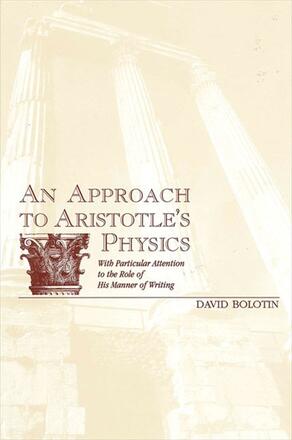
An Approach to Aristotle's Physics
With Particular Attention to the Role of His Manner of Writing
Alternative formats available from:
Argues that Aristotle's writings about the natural world contain a rhetorical surface as well as a philosophic core and shows that Aristotle's genuine views have not been refuted by modern science and still deserve serious attention.
Description
Maintaining that Aristotle's writings about the natural world contain a rhetorical surface as well as a philosophic core, David Bolotin argues in this book that Aristotle never seriously intended many of his doctrines that have been demolished by modern science. To that end, he presents a number of "case studies" to show that Aristotle deliberately misrepresented his views about nature--a thought that was commonly shared by commentators on his work in late antiquity and the middle ages. Bolotin demonstrates that Aristotle's real views have not been refuted by modern science and still deserve our most serious attention.
David Bolotin is a Tutor at St. John's College in Santa Fe. He is the author of Plato's Dialogue on Friendship: An Interpretation of the Lysis.
Reviews
"This remarkable work addresses with an open mind the question of the validity of Aristotle's natural science, in full awareness of the very great obstacles which stand in the way of an informed acceptance of its validity, obstacles stemming both from modern natural science and from the complexities and obscurities of the Aristotelian text itself.
"The book provides a truly philosophic treatment of the question of the requirements that a genuine science of nature would have to fulfill as well as of the related question of whether any approach is capable of fulfilling all of them. The treatment of these questions is all the more effective and illuminating for being presented in the course of case studies of central topics with which any such science would have to deal. Moreover, while the study is a pioneering one, and to that extent merely a first step, it is difficult to conceive that the foundation that it lays down for future work could be improved upon. " -- Christopher Bruell, Boston College
"The thesis is original and deserves a hearing. The author has a genuine interest in and grasp of scientific issues rare in classicists. " -- William Charlton, editor of Aristotle's Physics, Books 1 and 2, Clarendon Aristotle Series
"This will be a widely read book, for it is written with crystalline clarity and tackles the very big questions. ..with a startling directness, and with a magisterial erudition. The book will be controversial, in the fertile way that every original and profound contribution to scholarship is. I do not exaggerate when I say that of the very many books I have reviewed for presses in my career, this is the best, in terms of the magnitude of the contribution, the importance of the themes, and the likelihood of pathbreaking influence over the long term. Bolotin offers an original, bold, and even daring new perspective on Aristotle as a philosopher and writer by situating Aristotle's works, and above all his Physics, in their crucial historical and political context. What makes this book truly exciting is the fact that it is not intended simply as a contribution to intellectual history--though it is surely a very great contribution in that regard. As Bolotin lucidly explains in his introduction, this study is situated in the contemporary context of a serious revival of interest in Aristotle's philosophy of science as a crucial supplement and even corrective to the modern science which in its origins was explicitly anti-Aristotelian. " -- Thomas L. Pangle, University of Toronto